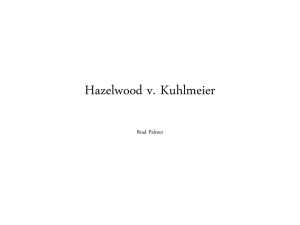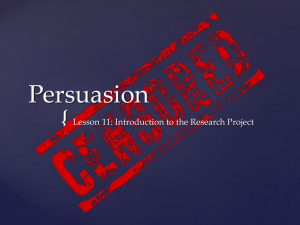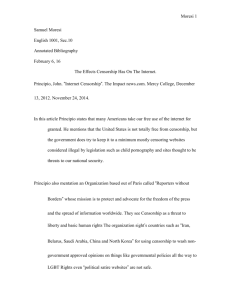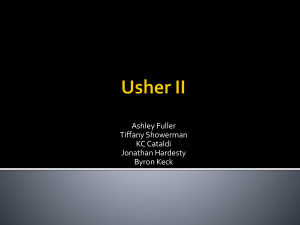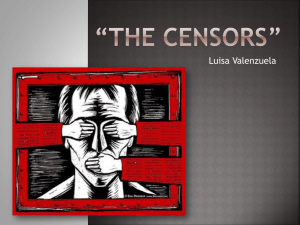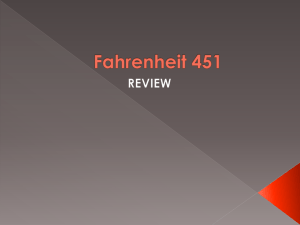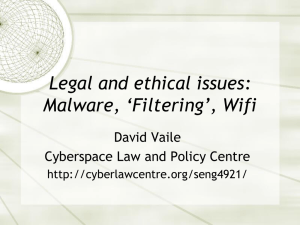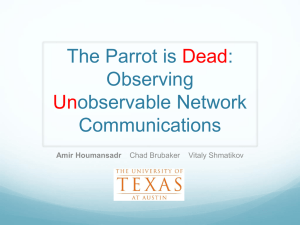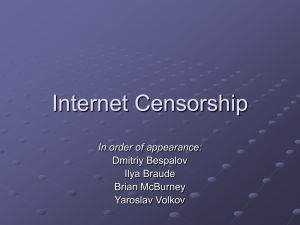Control + 1 * Block Headings
advertisement
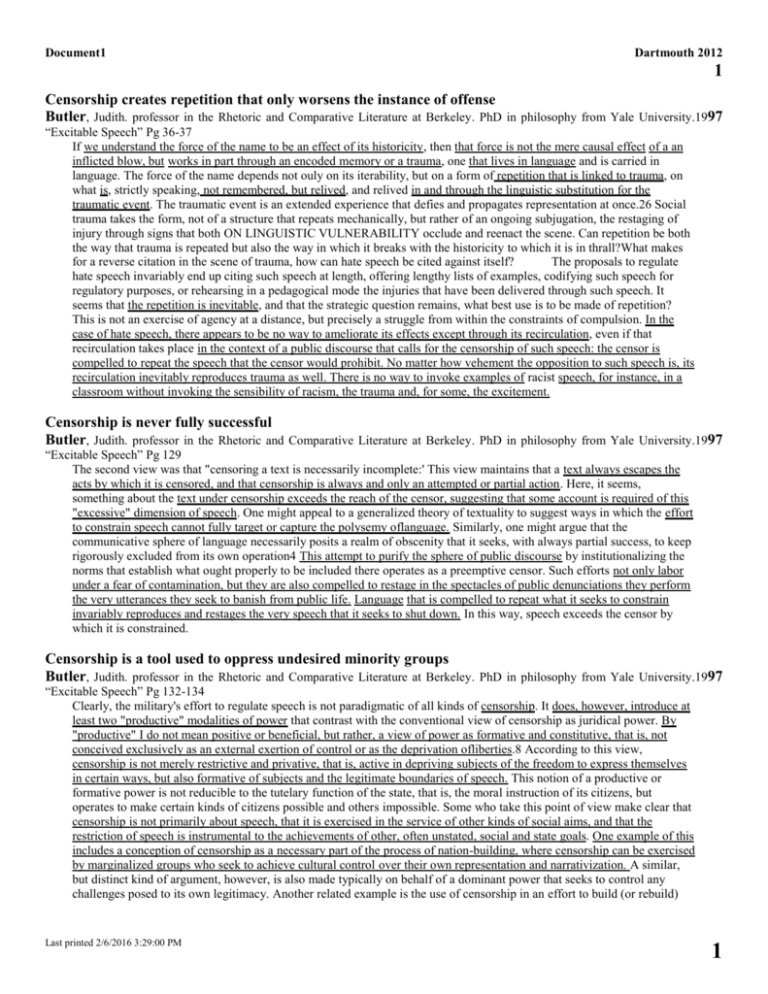
Document1 Dartmouth 2012 1 Censorship creates repetition that only worsens the instance of offense Butler, Judith. professor in the Rhetoric and Comparative Literature at Berkeley. PhD in philosophy from Yale University.1997 “Excitable Speech” Pg 36-37 If we understand the force of the name to be an effect of its historicity, then that force is not the mere causal effect of a an inflicted blow, but works in part through an encoded memory or a trauma, one that lives in language and is carried in language. The force of the name depends not ouly on its iterability, but on a form of repetition that is linked to trauma, on what is, strictly speaking, not remembered, but relived, and relived in and through the linguistic substitution for the traumatic event. The traumatic event is an extended experience that defies and propagates representation at once.26 Social trauma takes the form, not of a structure that repeats mechanically, but rather of an ongoing subjugation, the restaging of injury through signs that both ON LINGUISTIC VULNERABILITY occlude and reenact the scene. Can repetition be both the way that trauma is repeated but also the way in which it breaks with the historicity to which it is in thrall?What makes for a reverse citation in the scene of trauma, how can hate speech be cited against itself? The proposals to regulate hate speech invariably end up citing such speech at length, offering lengthy lists of examples, codifying such speech for regulatory purposes, or rehearsing in a pedagogical mode the injuries that have been delivered through such speech. It seems that the repetition is inevitable, and that the strategic question remains, what best use is to be made of repetition? This is not an exercise of agency at a distance, but precisely a struggle from within the constraints of compulsion. In the case of hate speech, there appears to be no way to ameliorate its effects except through its recirculation, even if that recirculation takes place in the context of a public discourse that calls for the censorship of such speech: the censor is compelled to repeat the speech that the censor would prohibit. No matter how vehement the opposition to such speech is, its recirculation inevitably reproduces trauma as well. There is no way to invoke examples of racist speech, for instance, in a classroom without invoking the sensibility of racism, the trauma and, for some, the excitement. Censorship is never fully successful Butler, Judith. professor in the Rhetoric and Comparative Literature at Berkeley. PhD in philosophy from Yale University.1997 “Excitable Speech” Pg 129 The second view was that "censoring a text is necessarily incomplete:' This view maintains that a text always escapes the acts by which it is censored, and that censorship is always and only an attempted or partial action. Here, it seems, something about the text under censorship exceeds the reach of the censor, suggesting that some account is required of this "excessive" dimension of speech. One might appeal to a generalized theory of textuality to suggest ways in which the effort to constrain speech cannot fully target or capture the polysemy oflanguage. Similarly, one might argue that the communicative sphere of language necessarily posits a realm of obscenity that it seeks, with always partial success, to keep rigorously excluded from its own operation4 This attempt to purify the sphere of public discourse by institutionalizing the norms that establish what ought properly to be included there operates as a preemptive censor. Such efforts not only labor under a fear of contamination, but they are also compelled to restage in the spectacles of public denunciations they perform the very utterances they seek to banish from public life. Language that is compelled to repeat what it seeks to constrain invariably reproduces and restages the very speech that it seeks to shut down. In this way, speech exceeds the censor by which it is constrained. Censorship is a tool used to oppress undesired minority groups Butler, Judith. professor in the Rhetoric and Comparative Literature at Berkeley. PhD in philosophy from Yale University.1997 “Excitable Speech” Pg 132-134 Clearly, the military's effort to regulate speech is not paradigmatic of all kinds of censorship. It does, however, introduce at least two "productive" modalities of power that contrast with the conventional view of censorship as juridical power. By "productive" I do not mean positive or beneficial, but rather, a view of power as formative and constitutive, that is, not conceived exclusively as an external exertion of control or as the deprivation ofliberties.8 According to this view, censorship is not merely restrictive and privative, that is, active in depriving subjects of the freedom to express themselves in certain ways, but also formative of subjects and the legitimate boundaries of speech. This notion of a productive or formative power is not reducible to the tutelary function of the state, that is, the moral instruction of its citizens, but operates to make certain kinds of citizens possible and others impossible. Some who take this point of view make clear that censorship is not primarily about speech, that it is exercised in the service of other kinds of social aims, and that the restriction of speech is instrumental to the achievements of other, often unstated, social and state goals. One example of this includes a conception of censorship as a necessary part of the process of nation-building, where censorship can be exercised by marginalized groups who seek to achieve cultural control over their own representation and narrativization. A similar, but distinct kind of argument, however, is also made typically on behalf of a dominant power that seeks to control any challenges posed to its own legitimacy. Another related example is the use of censorship in an effort to build (or rebuild) Last printed 2/6/2016 3:29:00 PM 1 Document1 Dartmouth 2012 1 consenSUS within an institution, such as the military, or within a nation; another example is the use of censorship in the codification of memory, as in state control over monument preservation and building, or in the insistence that certain kinds of historical events only be narrated one way. IMPLICIT CENSORSHIP The view of censorship as "productive;' however, is not always coextensive with views that hold that censorship is always instrumental to the achievement of other socia1.aims. Consider that in the examples I have just suggested, censorship is not primarily concerned with speech, and that the control or regulation of speech is incidental to the achievement of other kinds of social aims (strengthening particular views of legitimacy, consensus, cultural autonomy, national memory), In the most extreme version of this kind of instrumentalism, speech is cast as wholly incidental to the aims of censorship or, rather, speech works as a cover for the real political aims of censorship, ones that have nothing or little to do with speech. Censorship is a productive form of power: it is not merely privative, but formative as well. I propose that censorship seeks to produce subjects according to explicit and implicit norms, and that the production of the subject has everything to do with the regulation of speech. The subject's production takes place not ouly through the regulation of that subject's speech, but through the regulation of the social domain of speakable discourse. The question is not what it is I will be able to say, but what will constitute the domain of the sayable within which I begin to speak at all. To become a subject means to be subjected to a set of implicit and explicit norms that govern the kind of speech that will be legible as the speech of a subject9Here the question is not whether certain kinds of speech uttered by a subject are censored, but how a certain operation of censorship determines who will be a subject depending on whether the speech of such a candidate for subjecthood obeys certain norms governing what is speakable and what is not. To move outside <if the domain of speak ability is to risk one~ status as a subject. To embody the norms that govern speakability in one's speech is to consummate one's status as a subject if speech. "Impossible speech" would be precisely the ramblings of the asocial, the rantings of the "psychotic" that the rules that govern the domain of speakability produce, and by which they are continually haunted. 10 So/me would argue that no text can be fully freed from the shackles of censorship because every text or expression is in part structured through a process of selection that is determined in part by the decisions of an author or speaker and in part by a language that operatesaccording to selective and differential rules that no individual speaker ever made (that may well be collectively forged, but not traceable to a single author, except in specific cases of grammatical revision and coinage). A highly generalized thesis, it appears to apply to any and all language. And though it may well be true and valid, I think that in its generalized form, it does not directly translate into a political consideration of censorship or a normative view on how best to decide issues of censorship. Indeed, taken in its most generalized form, one normative implication of such a view is the following: because all expression is always already censored to some degree, it makes no sense to try to oppose censorship, for that would be to oppose the conditions of intelligibility (and, thus, to oppose the very terms by which the opposition is articulated). Survival within an institution of censorship is constantly threatened by regulations Butler, Judith. professor in the Rhetoric and Comparative Literature at Berkeley. PhD in philosophy from Yale University.1997 “Excitable Speech” Pg135-136 Although psychoanalysis refers to this inception of the subject as taking place in infancy, this primary relation to speech, the subject's entry into language by way of the originary "bar" is reinvoked in politicallife when the question of being able to speak is once again a condition of the subject's survival. The question of the "cost" of this survival is not simply that an unconscious is produced that cannot be fully assimilated to the ego, or that a "real" is produced that can never be presented within language. The condition for the subject's survival is precisely the foreclosure of what threatens the subject most fundamentally; thus, the "bar" produces the threat and defends against it at the same time. Such a primary foreclosure is approximated by those traumatic political occasions in which the subject who would speak is constrained precisely by the power that seeks to protect the subject from its own dissolution. This doubled dimension of the Lacanian "bar;' however, is to be thought not merely as a structure that once inaugurated the subject, but as a continuing dynamic in the life of the subject, The rules that constrain the intelligibility of the subject continue to structure the subject throughout his or her life, And this structuring is never fully complete, Acting one's place in language continues the subject's viability, where that viability is held in place by a threat both produced and defended against, the threat of a certain dissolution of the subject. If the subject speaks impossibly, speaks in ways that cannot be regarded as speech or as the speech of a subject, then that speech is discounted and the viability of the subject called into question. The consequences of such an irruption of the unspeakable may range from a sense that one is "falling apart" to the intervention of the state to secure criminal or psychiatric incarceration. The link between survival and speakability is delineated in the speech that constitutes the inauguration of the self-denying and repentant homosexual into military ranks: I am not what you suspect me to be, but my not being that is precisely what I have now become, thus, determined by my denial, my new self-definition. Or consider the situation that Saidiya Hartman has outlined in which the emancipation from slavery into citizenship requires the bartering of one's labor power, the translation of one's value into a commodity form and, hence, a new form of subjection.!2 The discourse of freedom in which one makes the claim of emancipation suppresses the very energies it purports to unleash. Or Last printed 2/6/2016 3:29:00 PM 2 Document1 Dartmouth 2012 1 note the predicament in which litigating against domestic sexual abuse requires that a woman offer a version of herself that vitiates any doubt as to her sexual purity, her ability to coincide before the law with an idealized and desexualized version of feminine heterosexuality. When we ask what it means to qualify to petition before the law, we note the belated repetition of foreclosure that orchestrates and makes possible a speaking subject with such a claim.13 Last printed 2/6/2016 3:29:00 PM 3

